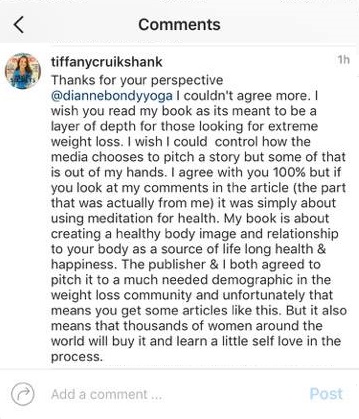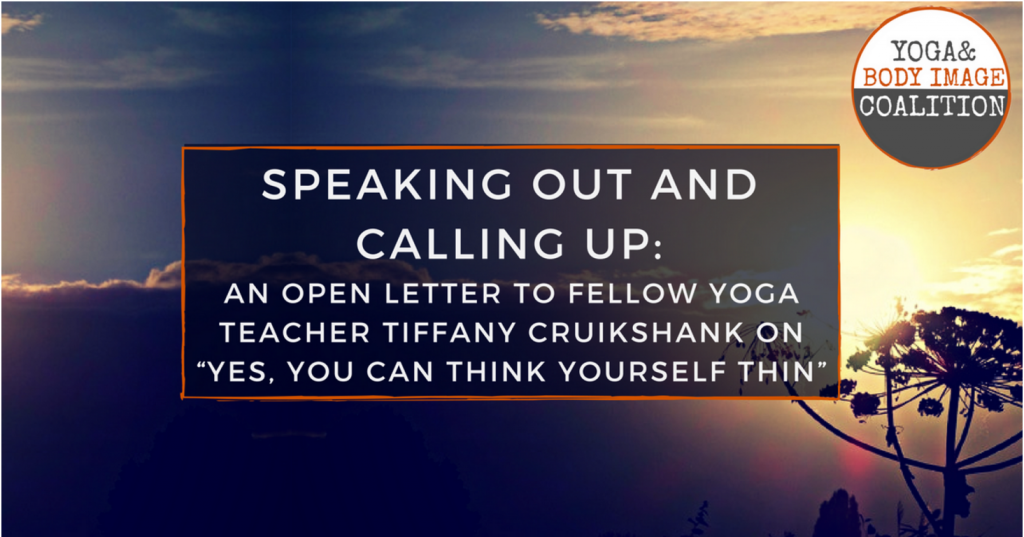Your article “Yes You CAN Think Yourself Thin: From resisting that biscuit to learning to love the gym, a life-changing book reveals the new way to hit your perfect weight” not only saddened and disheartened me but, as an eating disorder survivor, deeply triggered me.
As a yoga teacher I was angry and frustrated to see yet another teacher, a colleague of mine, profiting off of the “Thin Ideal” perpetuated in our society; the same ideal that I see so many of my students compelled to strive for. As I read on, I noticed the thin = happy and healthy theme that the diet industry utilizes to prey on people’s insecurities. In this article, you claim that meditation “is the queen of all good weight-loss habits.” I most definitely was not taught this in my 200 and 500 hour yoga training programs. I resonate more with this definition of meditation by Pia Guerrero, founder of Adios Barbie, “The true nature of meditation (and yoga) is for one to develop an experience of wholeness, compassion, love, patience, generosity and forgiveness.” From your article one would believe that you see mediation as a weight loss tool, and a slim body the key to happiness.
I am curious, which definition of meditation resonates most with you?
 In the “Meditate To Watch Weight” section of your article, key points are highlighted such as: “Picture yourself slimmer – going through every aspect of a full day. Really visualize all the detail and make a point of noticing everything that feels different…Then turn your mind towards creating this image of yourself at a healthy weight. What does it feel like? …Can you picture yourself slim? What do you look like? How does it feel? Try to notice all of the sensations in this new, healthy body.”
In the “Meditate To Watch Weight” section of your article, key points are highlighted such as: “Picture yourself slimmer – going through every aspect of a full day. Really visualize all the detail and make a point of noticing everything that feels different…Then turn your mind towards creating this image of yourself at a healthy weight. What does it feel like? …Can you picture yourself slim? What do you look like? How does it feel? Try to notice all of the sensations in this new, healthy body.”
Based on all of the above, it would be easy for me to assume the  worst, that you are simply preying on people’s lack of self-love, self-worth, and false belief in the “Thin Ideal” to make a profit. However, I have read social media comments from you in your exchanges with Dianne Bondyand passages from your book, that make me think differently; that you do not see the disconnect with what you are stating in your articles (which are all listed as either written by or endorsed by you), and how you are promoting “Meditate Your Weight” as a weight-loss book. It appears you acknowledged early on that your book was written to represent meditation as a weight-loss tool based on a review you have on your website by Well and Good. This review states: “We generally skip weight-loss books, but this one is super interesting for its unique approach to the topic”. In comments on Dianne Bondy Yoga’s Instagram page, you say you want to provide people with tools for a positive body image,…“My book is about creating a healthy body image and relationship to your body as a source of life long health & happiness…”
worst, that you are simply preying on people’s lack of self-love, self-worth, and false belief in the “Thin Ideal” to make a profit. However, I have read social media comments from you in your exchanges with Dianne Bondyand passages from your book, that make me think differently; that you do not see the disconnect with what you are stating in your articles (which are all listed as either written by or endorsed by you), and how you are promoting “Meditate Your Weight” as a weight-loss book. It appears you acknowledged early on that your book was written to represent meditation as a weight-loss tool based on a review you have on your website by Well and Good. This review states: “We generally skip weight-loss books, but this one is super interesting for its unique approach to the topic”. In comments on Dianne Bondy Yoga’s Instagram page, you say you want to provide people with tools for a positive body image,…“My book is about creating a healthy body image and relationship to your body as a source of life long health & happiness…”
When I read that I think YES, yoga and meditation can be used for exactly this! In fact that is what myself, Dianne, and the other members of The Yoga and Body Image Coalition are working for too. You are openly targeting and marketing to people who are struggling with body image issues and self-acceptance. Which would be fine if you were marketing your book just as that, “Meditate your Self-Acceptance” vs “Mediate Your Weight”.
just as that, “Meditate your Self-Acceptance” vs “Mediate Your Weight”.
There is a disconnect and contradiction in your message. You cannot be body positive and support diet culture at the same time.2 The two are mutually exclusive. Diet culture and the diet industry are not body positive, no matter what spin is put on it or how much justification is given as a means to a self-loving end. Being body positive, embracing health at every size, and believing in self-love as a path to health means you stand up and stand against the diet culture and diet industry every step of the way. As Pia Guerrero states, “Dieting cultivates a deep sense of lack and rejection of how one is right here, right now—the antithesis of any meditation practice.”
The intention of this letter is to call you up, not out. In doing so, the YBIC and I are calling you into embracing and taking on a true leadership role in the Body Positive Movement where you never compromise the movement for profit. As a public role model and founder of “Yoga Medicine”, you have the power to influence others, your words matter. And if you make a misstep, as we all do at some point, you acknowledge it, learn from it and do better next time.
As an Eating Disorder Advocate and someone in recovery, I feel compelled to address the impact that the message of your article also has on people who suffer from or are in recovery from an eating disorder (ED). I was personally  triggered by the “Yes, You CAN Think Yourself Thin” article. Yoga and meditation are powerful and effective tools of healing as an integral component of my own recovery as well as many others. Your article turns meditation into a potential weapon to be used against those suffering from an eating disorder, disordered eating and/or body dysmorphia as opposed to an ally in healing. Those who have experienced an eating disorder, know someone affected by an ED, or are an eating disorder recovery professional would agree that some of the information shared in this article is triggering and potentially harmful to someone in recovery. The president of The Association for Size Diversity and Health, Carmen Cool, MA, LPC, sums up this point in stating “Of all the benefits of meditation, let’s leave our bodies out of it. We can do better. We must do better if we want to live in a world where people can live peacefully inside of – and in the world with – their bodies as they are. Let’s use our practices to bolster us to work for a weight inclusive world.”
triggered by the “Yes, You CAN Think Yourself Thin” article. Yoga and meditation are powerful and effective tools of healing as an integral component of my own recovery as well as many others. Your article turns meditation into a potential weapon to be used against those suffering from an eating disorder, disordered eating and/or body dysmorphia as opposed to an ally in healing. Those who have experienced an eating disorder, know someone affected by an ED, or are an eating disorder recovery professional would agree that some of the information shared in this article is triggering and potentially harmful to someone in recovery. The president of The Association for Size Diversity and Health, Carmen Cool, MA, LPC, sums up this point in stating “Of all the benefits of meditation, let’s leave our bodies out of it. We can do better. We must do better if we want to live in a world where people can live peacefully inside of – and in the world with – their bodies as they are. Let’s use our practices to bolster us to work for a weight inclusive world.”
You see, people who suffer from an eating disorder have a difficult time differentiating between healthy and harmful thoughts. When someone is deep in their disorder it is often the voice of the eating disorder that speaks the loudest and the one that is followed the most. Eating Disorders love to find ways to convince you that you are making a healthy choice, when in reality (and obvious to people without an ED) that choice is damaging to your health.
Eating Disorders are so damaging to the health of the sufferer that it has the highest mortality rate of any mental illness. So when a yoga teacher, someone who considers themselves a “health expert,” and teaches “yoga as medicine” tells you that they have a way that you can become a slimmer, sexier, happier person, you pay attention. And when part of that solution is to “resist that biscuit and learn to love the gym” well, the ED loves that even more. “See,” says the eating disorder, “it’s healthy”. “I’m being healthy”….when all the while that meditation that helped you resist that biscuit and go to the gym, also helped you resist breakfast, lunch and dinner. That is when this advice goes from irresponsible to potentially deadly. What I have discovered through the process of writing this post, (which entailed connecting with other yoga teachers, as well as people in the eating disorder recovery community) is that there is a great need for more education to be provided to yoga teachers with regard to eating disorders and eating disorder recovery. This is not something you are alone in needing education in. Jenny Copeland, PsyD, RYT200 offered this insight, “We are limited only by our capacity to be open, our willingness to see  what we have been ignorant of for so long. So ask the question, anticipate how one action leads to the next, and shine the light on all that yoga has to offer to all bodies, just as they are.”
what we have been ignorant of for so long. So ask the question, anticipate how one action leads to the next, and shine the light on all that yoga has to offer to all bodies, just as they are.”
Tiffany, I said before that I was asking you to do better. I think that is something that we all can take to heart. I am grateful that the platform provided by the Yoga and Body Image Coalition exists so we as a yoga community can continue to engage in much needed conversations; to learn and grow together as teachers and practitioners. As Maya Angelou says “Do the best you can until you know better. Then when you know better, do better.” Let’s all hold each other accountable to know and do better.
In solidarity,
Nikki Cook
 Nikki is a member of the Yoga and Body Image Coalition. She is a 200 hour registered yoga teacher, 300 hour certified children’s yoga teacher, Unnata certified aerial yoga teacher and has a 500 hour certification in therapeutic yoga. Through her teaching and work with the Yoga and Body Image Coalition, Nikki advocates for advancements in the diagnosis and treatment of eating disorders, including the use of yoga and meditation as an integral part of recovery from eating disorders, disordered eating and body dysmorphia. You can visit Nikki online atnikkicookyoga.com or get in touch via email: nikkicookyoga@gmail.com
Nikki is a member of the Yoga and Body Image Coalition. She is a 200 hour registered yoga teacher, 300 hour certified children’s yoga teacher, Unnata certified aerial yoga teacher and has a 500 hour certification in therapeutic yoga. Through her teaching and work with the Yoga and Body Image Coalition, Nikki advocates for advancements in the diagnosis and treatment of eating disorders, including the use of yoga and meditation as an integral part of recovery from eating disorders, disordered eating and body dysmorphia. You can visit Nikki online atnikkicookyoga.com or get in touch via email: nikkicookyoga@gmail.com
